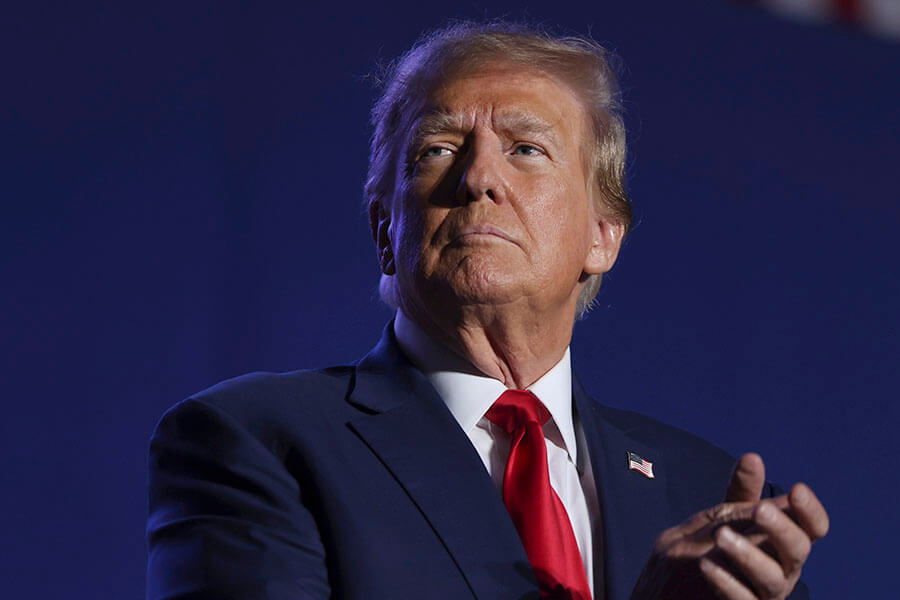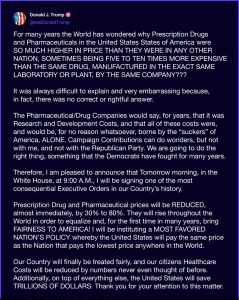
Nigerians May Pay More for Medicines After Trump’s Pharmaceutical Price Cuts

Nigerians may pay more for prescription drugs following President Donald Trump’s announcement of price reductions in pharmaceuticals within the US.
The move, said to slash drug prices for American consumers, may have unintended consequences for countries like Nigeria that heavily depend on imported medicines, according to an analysis by The Cable.
In a late-night post yesterday on Truth Social, Trump revealed plans to sign an executive order that would reduce prescription drug prices in the US by 30 to 80 per cent.

Explaining the rationale, he criticised pharmaceutical companies for inflating drug prices in the US, allegedly to recoup research and development costs, making American consumers bear the brunt of global healthcare costs.
This new policy, he said, would implement a “Most Favoured Nation” clause, ensuring the US pays no more than the country with the lowest drug prices globally.
While the executive order is framed as a domestic policy, experts warn it could ripple through global pharmaceutical markets. Pharmaceutical companies might respond by raising prices in other countries or limiting drug supply to maintain profit margins.
For instance, Nigeria, where over 70 per cent of medicines are imported, could be hit hard. With the local pharmaceutical industry supplying only about 25 per cent of domestic demand, Nigerians remain vulnerable to global price fluctuations, foreign exchange volatility, and supply chain disruptions.
The country’s total healthcare spending is estimated at $10 billion, of which medicines account for nearly $4 billion. Out-of-pocket expenses comprise 62 per cent of Nigeria’s healthcare spending, mainly due to limited health insurance coverage. Therefore, any increase in drug prices will be borne directly by consumers, exacerbating existing economic inequalities.
Health experts warn that branded and speciality medicines, already expensive, could become even more unaffordable for ordinary Nigerians. This would be particularly concerning for treatments for chronic conditions like diabetes, hypertension, cancer, and infectious diseases.
With previous Trump administration policies involving reviews and freezes of foreign aid, there are fears that changes in US pharmaceutical procurement strategies might affect the availability of affordable or donated medicines to Nigeria.
This could jeopardise the fight against HIV, tuberculosis, and malaria, for which Nigeria depends on international assistance.
Recently, Sickle cell patients in Nigeria have taken to social media to express frustration over the rising cost of routine medications and the absence of government support, as the country grapples with the economic fallout of President Bola Tinubu’s policies.
Read Also:
About The Author
Related Articles
Asake Sets New Billboard Afrobeats Record as Chart Presence Grows
Asake has further cemented his place as one of Afrobeats’ most dominant...
ByWest Africa WeeklyJanuary 29, 2026Nigerians Lament PayPal’s Return as Old Wounds Resurface
PayPal’s reentry into Nigeria through a partnership with local fintech company Paga...
ByWest Africa WeeklyJanuary 29, 2026Tanzania Eyes Gold Sales as Aid Declines and Infrastructure Needs Grow
Tanzania is weighing plans to sell part of its gold reserves to...
ByWest Africa WeeklyJanuary 29, 2026Mali Tightens Grip on Explosives Supply With New Majority Stake
The Malian government has taken majority ownership of a civil explosives manufacturing...
ByWest Africa WeeklyJanuary 29, 2026












Leave a comment